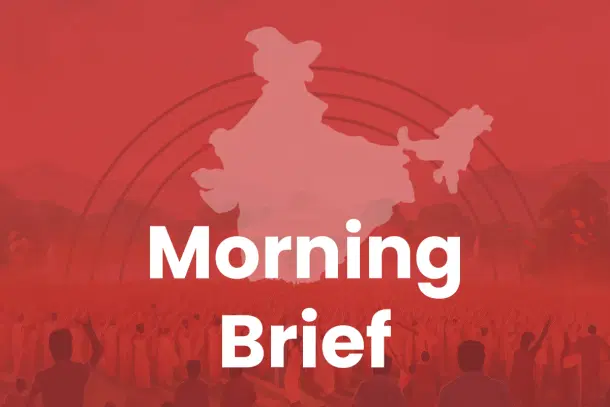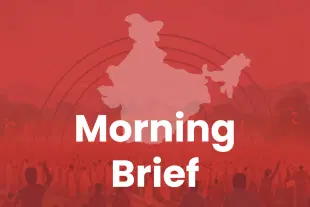News Brief
Morning Brief: US 'Satisfied' With India’s Cooperation In Pannun Probe As Trudeau Mopes; Israel Kills Hamas Chief; JNU's Shivaji Centre To Offer Lessons From Maratha Military History
Swarajya Staff
Oct 18, 2024, 07:57 AM | Updated 08:03 AM IST
Save & read from anywhere!
Bookmark stories for easy access on any device or the Swarajya app.


Dear reader, here’s a roundup of what’s making headlines this morning.
US Satisfied With India’s Cooperation In Pannun Probe
The US State Department expressed satisfaction with India's cooperation in the investigation into an alleged plot against pro-Khalistan separatist Gurpatwant Pannun. During a productive meeting with the visiting Indian team, it was revealed that a Central Reserve Police Force officer named Vikram Yadav, working with the Research and Analysis Wing, is implicated in recruiting an individual to hire a hitman for Pannun. This hitman turned out to be an undercover US agent, leading to the arrest of Indian national Nikhil Gupta in Prague, who has pleaded not guilty in the US.
India has reiterated that it does not condone transnational killings while pushing back against the US and Canada for their lenient attitudes toward violent Khalistani extremists. Pannun, a dual citizen of the US and Canada, continues to threaten Indian officials with impunity, while Canada has publicly accused India of involvement in the assassination of Sikh separatists, lacking evidence for its claims.
Israel Kills Hamas Chief Sinwar In Gaza
Israel announced Thursday night that IDF troops had killed Hamas leader Yahya Sinwar in southern Gaza during a firefight on Wednesday. Sinwar, who orchestrated the October 7 Hamas attack on southern Israel, was killed in Rafah, although troops did not initially realize his identity. DNA testing later confirmed it was Sinwar after part of his finger was removed for expedited testing due to booby traps in the area.
Sinwar death marks a significant blow to Hamas leadership, especially following Israel’s recent killing of Hezbollah leader Hassan Nasrallah. Despite Sinwar's death, Prime Minister Benjamin Netanyahu indicated that Israel’s offensive in Gaza would continue. This event has thrown the Gaza conflict into a new, uncertain phase.
JNU's Shivaji Centre To Offer Lessons From Maratha Military History
Jawaharlal Nehru University is set to establish a ‘Centre of Excellence’ named after Chhatrapati Shivaji Maharaj, aimed at exploring lessons from his era to understand the “concept of Akhand Bharat” and his “struggle for Hindavi Swaraj.”
The Chhatrapati Shivaji Maharaj Centre for Security & Strategic Studies, which will be supported by the Maharashtra government, will focus on teaching Indian strategic thought, Maratha military history, Shivaji’s naval strategy, and guerrilla warfare. The centre plans to offer undergraduate and postgraduate courses starting 2025.
"The concept of Akhand Bharat, often misunderstood as an imperial expansionist role, refers to a united and undivided India, and the essential role it plays in influencing contemporary strategic decisions...," the proposal for the ‘Centre of Excellence’ says, adding, "Chhatrapati Shivaji Maharaj’s struggle for Hindavi Swaraj, or self-rule, is a prime example of how India can shape its strategic culture."
Also Read: The Great Maritime Ambitions Of Hindavi Swarajya
Other Developments
China Posts Slowest GDP Growth In Over A Year
China's economy is struggling, with growth slowing to 4.6 per cent in the third quarter, according to the National Bureau of Statistics. This is down from 4.7 per cent in the previous quarter and is the slowest growth since early 2023, when the country was just coming out of strict COVID-19 restrictions.
Although this growth was slightly better than what analysts expected at 4.5 per cent, it still raises concerns for the Chinese Communist Party. In response to these issues, the Chinese government has ramped up stimulus efforts since late September to try to hit their target of around 5 per cent growth for the year.
Nawaz Sharif Says Jaishankar's Visit A Good Opening
Former Pakistan Prime Minister Nawaz Sharif stressed that India and Pakistan should “bury the past” and look to the future during a chat with visiting Indian journalists on Thursday. He called External Affairs Minister S Jaishankar’s trip to Islamabad for the SCO meeting a “good beginning” and an opportunity for both countries to move forward.
Sharif said the talks should continue and suggested that it would have been better if Prime Minister Narendra Modi had come to the meeting himself. He reminisced about his previous meeting with Modi during the Indian PM's surprise visit to Pakistan in December 2015, urging both nations to “pick up the threads where we left.”
Bangladesh's Attempt To Arrest Hasina A Toothless Manoeuvre
On Thursday, Bangladesh's International Crimes Tribunal (ICT) issued an arrest warrant for former Prime Minister Sheikh Hasina, accusing her of "crimes against humanity" from July to August. India responded, stating that Hasina is in the country for her safety after being ousted during an Islamist-led uprising on August 5, while urging the interim Bangladeshi government to protect minorities.
Hasina was the one who established the ICT to pursue war criminals from the 1971 genocide. If the interim government seeks her extradition, the India-Bangladesh Extradition Treaty complicates matters by prohibiting extradition in political cases. It is unlikely that India would hand over Hasina to Muhammad Yunus's interim regime, which has made no friends in India with its handling of the relations.
From The States
Assam: SC Verdict On Section 6A Boosts Congress' Narrative
The Congress welcomed the Supreme Court's decision to uphold the constitutional validity of Section 6A of the Citizenship Act, 1955, which grants citizenship to immigrants who entered Assam before March 25, 1971. Congress insiders believe this ruling could weaken Assam Chief Minister Himanta Biswa Sarma's reliance on a blend of Hindutva and Assamese identity politics, as it settles the cut-off year for citizenship. The issue of undocumented immigration from Bangladesh and its impact on Assamese identity has been a key focus of Sarma’s politics, particularly after the 2019 Lok Sabha elections.
In September, Sarma announced 1951 as the cut-off year for the implementation of certain recommendations from the Justice Biplab Sharma Committee. However, the Supreme Court's ruling in favour of the 1971 cut-off has settled the matter.
Haryana: OBCs Get Lion’s Share In BJP's New Cabinet
The BJP has formed a 13-member Cabinet in Haryana, led by Chief Minister Nayab Saini. The Cabinet aims to balance caste equations and regional representation, including MLAs from various communities such as Dalit, Jat, Brahmin, Ahir, Punjabi, Gurjar, Baniya, and Rajput. Notable political figures, including seven-time MLA Anil Vij, Arti Rao Singh (daughter of Union Minister Rao Inderjit Singh), and Shruti Choudhry (granddaughter of former CM Bansi Lal), have been included.
The Cabinet features five OBC ministers, with significant representation from the community, including Saini and other OBC leaders like Rao Narbir Singh and Ranbir Singh Gangwa. The inclusion of Arti and Narbir is seen as a strategy to enhance representation from South Haryana, crucial to the BJP's electoral success since 2014. The Cabinet includes two ministers each from the Jat and Dalit communities.
Bihar: 25 Dead In New Hooch Tragedy Amid Calls To Reverse Liquor Ban
At least 25 people have died after consuming spurious liquor in Siwan and Saran districts of Bihar, with many others hospitalised in critical condition. Among the deceased, 20 were in Siwan and five in Saran, and authorities have arrested 12 individuals for allegedly selling illegal liquor. This incident has intensified the political debate over the liquor ban in Bihar, which has been a contentious issue for some time now.
Prashant Kishore, who recently launched a party to contest the 2025 assembly elections, has vowed to reverse the ban, which Chief Minister Nitish Kumar defends as part of his legacy. Kishore has previously described the current prohibition as “the most fake one,” asserting that the state incurs a loss of nearly Rs 20,000 crore annually while the liquor mafia and corrupt officials profit from illegal trade.
Stay tuned for more insights throughout the day.





